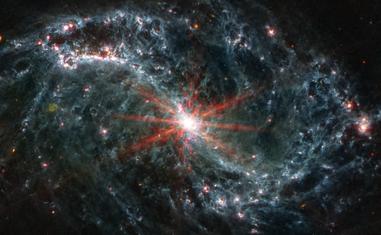The views expressed in our content reflect individual perspectives and do not represent the authoritative views of the Baha'i Faith.
I just finished a wonderful book about a subject I love: Big History. Unlike the history we learn in school, this type of history focuses on a much larger period: the beginning of the universe until now.
Let me share some of the key timeline moments mentioned in The Shortest History of the World by David Baker:
- Creation of the universe: 13.8 billion years ago
- Formation of the earth: 4.5 billion years ago
- Life on earth emerges: 3.8 billion years ago
- Dinosaurs go extinct: 66 million years ago
- Homo sapiens emerge: 315,000 years ago
Notice the mindboggling number of zeros tied up in those thousands and millions and billions of years?!
With all that time traversed and the different forms the universe and also our planet itself have existed in, it makes me wonder why creation has taken place in this way – and what the purpose behind creation is in the first place.
RELATED: Is Our Universe Expanding? A Baha’i Look at Einstein’s Theory
There is a famous Islamic Hadith that says of God’s purpose in creating the world: “I was a hidden treasure; I loved to be known. Hence I created the world so that I would be known.”
In one of his prayers, Baha’u’llah, the prophet and founder of the Baha’i Faith, echoed this concept and also explained the importance of the human race:
Lauded be Thy name, O Lord my God! I testify that Thou wast a hidden Treasure wrapped within Thine immemorial Being and an impenetrable Mystery enshrined in Thine own Essence. Wishing to reveal Thyself, Thou didst call into being the Greater and the Lesser Worlds, and didst choose Man above all Thy creatures, and didst make Him a sign of both of these worlds, O Thou Who art our Lord, the Most Compassionate!
We can see here that because the Creator wanted to be known, He did not only create the spiritual and physical world but also we human beings (here the word “man” refers not only to men but also to women).
What sets human beings apart from other lifeforms on Earth is that we have conscious awareness; therefore, we can create civilizations, discover scientific truths, contemplate the future, and come to know God. However, this quotation could also apply to extra-terrestrial lifeforms in other parts of the universe. As Baha’u’llah wrote: “Know thou that every fixed star hath its own planets, and every planet its own creatures, whose number no man can compute.”
If it is true that every fixed star has creatures living on planets in its orbit, then considering the vast number of stars in the universe, it seems very possible that there are other conscious beings out there. So, following this line of thought, one of the fundamental purposes behind creation is that intelligent beings like homo sapiens can know God.
This is a big statement and one that could be taken the wrong way, so let’s clarify it. It does not mean that we humans have ownership of the Earth, and can do whatever we wish without thinking of the other creatures and lifeforms that live here. It also doesn’t mean that other forms of life are not sacred – instead, while all of creation is a mirror of the Divine and every aspect of creation embodies one or more of the attributes of God, the Baha’i teachings say there is something unique about human beings, and other rational beings who may potentially exist – we have the ability to know and worship God.
But this begs the question: if human beings are the fundamental purpose of creation, then why didn’t God create human beings from the start? Why did God create a universe that took billions of years to form? Why did complex life, such as the dinosaurs, evolve and then disappear, if we are the ultimate reason God made the universe?
While such questions are only natural to ask, please forgive me for attempting to answer them, for to do so is in a sense an attempt at reading the Mind of God, which is obviously impossible.
The questions above, like all questions no doubt, are very human. They are tied up with our own notions of purpose embedded in our own lives. We naturally think that if we are creating something for a purpose, then we should cut to the chase and create that thing – don’t dilly-dally doing other things – just do it!
The potter’s purpose in a traditional village is to create pots. He or she spins clay to form vessel-like objects to be used to hold food or liquid or other objects. The potter’s purpose would seem less clear if he or she spent years and years making clay figurines only to smash them against the wall every time they cooled after getting them out of the kiln. Meanwhile, the people in the village are waiting for a vessel to store their rice in! Where’s the purpose in that?
This shows our bias towards immediate results, which is even more accentuated in modern society with our streamlined production lines and tight schedules. We often think that an essential purpose should manifest itself immediately, otherwise it would not be essential. Looking at God’s creation this way, we would naturally wonder, why did the creation of the universe and world around us take so long, if we are such an integral reason for it all?
But we can’t see God’s creation that way. We have to look at it with a wide-angle lens, putting our linear logic to the side. From God’s perspective, there is no time. God exists beyond space and time. So the billions of years that have transpired since the universe began don’t have the same staggering sense to God as they do to us. But even from a human angle we can see that sometimes things do take time to bear fruition – and we don’t know when and where other conscious, God-loving beings were created in other parts of the universe, either.
RELATED: Is the Universe Ordered or Chaotic?
Another possible reason for the vast amount of time and space of the universe around us is that this is the only way for God to reveal His attributes of glory, wonder, awe, and power. Let’s remember that everything in creation mirrors one or more attributes of God, because not only did He create human beings as a microcosm of His image, but all of creation itself. Could we really contemplate God’s power and might in a universe the size of the Earth in a timeframe the length of human history? No. That would not do justice to the might and power of God. That would not be an adequate expression of these majestic and unlimited attributes.
There are many mysteries in the way that life has been created. Why have different life-forms, like the dinosaurs as just one example, emerged and then disappeared? Well, what if God created the dinosaurs just so that we could discover their fossilized bones buried under the Earth? What would the sense be in this? Perhaps to allow us to develop our powers of investigation and discover the past, to question our own notions of what life is, to grapple with the reality of extinction.
In the end, we cannot read the Mind of God. We can only muse on the deep mysteries of life, which itself seems like a meaningful purpose.
You May Also Like
Comments

















consciousness like unto those who live on the surface of this globe: the power of adaptation and environment moulds their bodies and states of consciousness, just as our bodies and minds are
suited to our ...planet ....”
“Divine Philosophy,” compiled by I.F. Chamberlain (Boston: The : The Tudor Press, 1918), pp. 114-15
Himself, the All-Searching, the All-Wise.”
(“Gleanings from the Writings of Baha’u’llah” Wilmette: Baha’i Publishing Trust, 1983
pp.152-53)